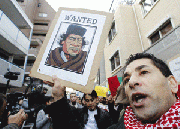
|
| An anti-government demonstrator holds a Kingdom of Libya flag in Benghazi city February 24, 2011. Muammar Gaddafi blamed a revolt against his rule on al Qaeda leader Osama bin Laden on Thursday and said that as Libyan leader he only had “moral authority.” REUTERS/Asmaa Waguih |
Many of the area’s Libyan Americans have multiple family members remaining in the country and some have lost loved ones, including a man named Faraj who lives in Hamtramck. Faraj’s brother-in-law Mohamed was shot and killed while attempting to recover a wounded countryman earlier this week in the city of Benghazi, a port city in northeastern Libya.
“He didn’t do anything wrong, he removed one of the (wounded protesters) to put him in his car, he has no gun, nothing, not even a stick to defend himself but somebody came in and shot him three times,” Faraj said.
50-year-old Ann Arbor native and Libyan American Salah Huwio, who works as a contractor in the home remodeling business, said that members of his own family had a serious close call in the same city.
“One of the mercenaries (from an outside African country hired by Gaddafi’s regime) walked into their home through the garden in the middle of the house, and my brother-in-law saw him,” Huwio said.
“He looked him in the eye and he shot four bullets into the air and walked out just to add to the fear they had.”
On Tuesday, Feb. 22, dozens of Libyan Americans showed up at a news conference denouncing the attacks on protesters by the Gaddafi regime and calling for a regime change. The event was organized by the Michigan office of the Council on American-Islamic Relations and held at the Islamic Center of Detroit.

|
| Dr. Tarsin |
While attacks on protesters have stopped in Benghazi as people surrounded the city’s courthouse in the shadows of tanks and other armored vehicles according to Huwio, he was still concerned that a return to violence from Gaddafi’s regime could occur again at some point down the line.
And for the better part of the past week, Huwio, who came to the U.S. in 1978, has had a hard time sleeping as he stays up late and wakes up early to scope out the most recent events in his original home country, where his entire extended family including his mother, brothers, and sisters all live.
“It’s fine now but my mother told me earlier that for four or five days it was like a ball of fire (on the streets of Benghazi),” Huwio said.
The worst may still be yet to come in the area of Tripoli, which is where much of Libyan American Dr. Mahmoud Tarsin’s family resides. Tarsin works at the Detroit Medical Center as a urologist while continuing to keep an eye on events.
He noted that Gaddafi had surrounded himself in Tripoli with five camps headed by his sons with different weapons at their disposal, likely in anticipation of such a major uprising.
He’s worried for his brother, sister, and other family members, who he has been unable to contact due to phone and internet restrictions but also proud of the Libyan people and hopeful for revolution.
“I consider the whole Libyan population as family and whatever affects them affects me, definitely it hurts when it comes to your immediate family but the whole country and every single Libyan is like part of my family,” he said.
Huwio has seen Gaddafi’s brutality against protesters before and knew what he was capable of, but he still was found himself in a state of disbelief when attacks against peaceful protesters broke out.
“I am in shock for Libya right now, especially with the information of what’s happening inside Tripoli,” he said, noting that he heard Gaddafi had hidden and moved both dead protesters and wounded ones from hospitals after he invited media members back into the area.
“My father died in 1988 but what we were always afraid of is finally happening right now.
“Gaddafi is a weirdo, who is he trying to fool? He lives in an illusion, I’m not sure if he’s bipolar or some kind of psychopathic individual or what.”
He said that Libyans are very welcoming people to all foreigners and that their uprising is based on the crying need for dignity and freedom like everyone else.
He hopes that fellow Americans will join in the fight and stand in solidarity with the people.
“American security would be much higher with a sane person rather than this madman, as an American citizen, this is wrong, we need to call our senators, congressmen, even our city reps Because they all can help.”
Tarsin is thankful for support from American countrymen as well including those attending recent solidarity rallies in metro Detroit.
“I just would like to express my appreciation to Americans in their support of the Libyan cause and also for those who are putting the pressure on the White House to have some sort of resolution to minimize the harm and suffering of the Libyan people,” he said.
Tarsin left the country more than 33 years ago because of his disdain for Gaddafi’s totalitarian regime and hasn’t visited since 1977, but he said another trip could be in the works.
“Once the people are free again, I will come right away and visit,” he said.






Leave a Reply